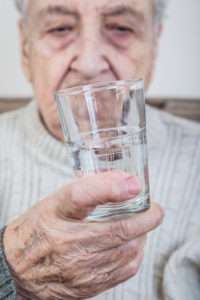
Extreme dehydration has been known to lead to death, according to MedlinePlus. When nursing home employees fail to properly care for their residents, simple dehydration can quickly lead to much more serious complications.
The longer the human body goes without water and nutrients, the more likely the sufferer is to endure life-altering effects. However, elderly patients who already suffer from negative health conditions may die of dehydration much quicker than other patients who are relatively healthy.
Since dehydration can lead to death, you need to understand the importance of noticing warning signs. Without an appropriate amount of fluids, the vital organs will begin shutting down, which can affect the heart, kidneys, and other organs.
Complications of Dehydration
According to the Mayo Clinic, the critical complications of dehydration neglect may include:
- Seizures
- Heatstroke
- Cerebral edema, which causes the brain to swell and may lead to brain damage
- Hypovolemic shock, caused by low blood pressure and low oxygen levels in the bloodstream
- Kidney failure
- Coma
- Death
These side effects of dehydration are what make the initial problem so life-threatening.
For a free legal consultation, call (855) 605-2959
What Are the Initial Symptoms of Dehydration in Elderly Patients?
The warning signs of dehydration include dry mouth, confusion, dark urine, blood in the stool, and fatigue, according to studies from Mayo Clinic. Ultimately, the initial symptoms of dehydration may be difficult to identify in elderly patients, especially if they are already dealing with complicated health conditions like Parkinson’s, dementia, or Alzheimer’s disease.
At any rate, dehydration can affect people physically, mentally, and psychologically. Accordingly, you should watch out for any changes to the person’s skin tone, bathroom habits, eating habits, personality, sleep schedule, or overall demeanor.
Additional symptoms of dehydration may include:
- Diarrhea that lasts more than 24 hours
- Discolored bowel movements
- Irritability
- Confusion or delusions
- The sufferer can no longer drink or eat
- Becoming less active and more tired
Dehydration in Nursing Homes Does Need to Be Intentional to Be Abusive
Residents of nursing homes can suffer from dehydration due to neglect. The issue is further compounded by the fact that minor cases of dehydration are likely to go unreported. Some families are not even aware that their loved one was subjected to dehydration in their assisted living facility until they are hospitalized, or even killed, from the abuse.
The important thing to keep in mind is that nursing home abuse does not have to be intentional to qualify as abuse. Dehydration neglect can occur rapidly because an employee was not paying close enough attention to a patient. If a nursing home worker is not closely monitoring their patients, dehydration can be the resulting effect of their negligence.
Fortunately, this form of abuse does not have to go unpunished. Assisted living facilities may be held accountable for the outcome of dehydration neglect if they did not do enough to prevent it from occurring. You may start with filing an insurance claim with the nursing home’s provider, but if negotiations do not yield fair compensation, you can file a wrongful death lawsuit.
Click to contact our personal injury lawyers today
A Nursing Home Abuse Lawyer Can Fight for Your Loved One
We understand that the legal process may seem intimidating, especially if you are dealing with a large nursing home. Once we learn more about your specific case, our team of attorneys can begin developing an action plan to help you seek justice. While no amount of compensation can take away the pain you have endured, your case may help prevent this type of abuse from occurring to other residents.
For more information about taking legal action after an instance of nursing home abuse, contact a High Stakes Injury Law team member today at (702) 605-6671 to receive your free consultation.
Call or text (855) 605-2959 or complete a Free Case Review form

